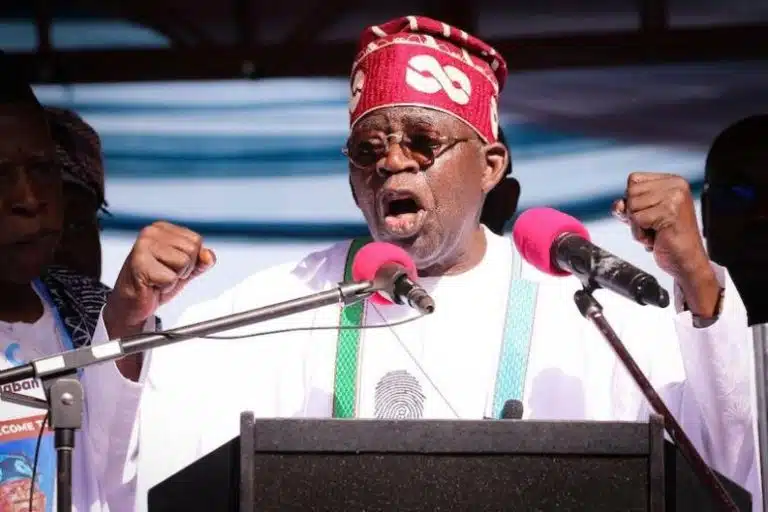Nullify: The President-elect, Bola Tinubu has been accused by the Action Peoples Party (APP) of manipulating the presidential election held on the 25th of February, 2023.
The petition filed by APP is among the five separate petitions that various political parties and their presidential candidates have filed.
The petitions were filed before the Presidential Election Petition Court in Abuja to challenge Tinubu’s victory.
The Independent National Electoral Commission (INEC) on 1 March declared Tinubu who contested on the platform of the All Progressives Congress (APC).
Tinubu polled 8.8 million votes to beat the Peoples Democratic Party (PDP) presidential candidate, Atiku Abubakar, and the Labour Party’s flagbearer, Peter Obi.
Atiku garnered 6,984,520 votes while Obi won 6,101,533 votes.
Meanwhile, the presidential candidates and their political parties are challenging the outcome of the polls in court.
The APP presidential candidate, Nnadi Osita, polled 12,839 votes in the election.
The APP in its move to nullify Tinubu’s victory filed a petition at the Presidential Election Petition Tribunal in Abuja on 19 March.
The petitioner anchored its complaint on the basis that Tinubu “corruptly induced” electoral officers at local government and state collation centres in “Kano, Kaduna, Imo, Rivers, Kebbi, Oyo, Ogun, Ekiti, Osun, Kogi and Kwara states” to alter the presidential election results in his favour.
The party alleged that “fictitious figures were ascribed to” Mr Tinubu “thereby giving him substantial lead and advantage in the various states.”
Another issue the petitioner raised is vote-buying.
In the grounds of the petition, the petitioner said Mr Tinubu “engaged in monumental vote-buying and openly offered money and other gift items to voters in polling units spread across Kano, Kaduna, Imo, Rivers, Kebbi, Oyo, Ogun, Ekiti, Osun, Kogi and Kwara states.”
The petitioner further alleged that voters who turned down the president-elect’s inducement “were refused from voting, thereby reducing the votes ordinarily accruing to” it.
The party accused INEC officials of looking away while over-voting was on at the polling units. It added that electoral officers in connivance with Mr Tinubu and APC agents, “falsified, altered and mutilated (election) results from the various polling units” in the eleven states mentioned above.
Citing instances of places where the presidential election could not hold due to violence, the petitioner alleged that votes were allocated to polling stations in Orlu, Orsu and Okigwe Local Government Areas of Imo State.
“Scores were later ascribed and credited to” to Mr Tinubu “in respect of Orlu, Orsu and Okigwe Local Government Areas of Imo State, where no election held.”
Owing to the alleged widespread irregularities, the petitioner contended that Mr Tinubu should not have been “returned elected as the president-elect”.
Violation Of The Electoral Act
The petitioner also questioned the validity of the election based on alleged non-compliance with the mandatory provisions of the 2022 Electoral Act.
It argued that INEC “has a bounden statutory obligation to transmit all the results electronically and to upload same into the INEC Result Viewing Portal (IReV)”
The APP further contended that the results of the 25 February presidential election were supposed to be transmitted directly from all polling units across Nigeria to the INEC IReV portal.
Instead of complying with the guidelines and regulations on electronic results transmission, the electoral umpire “failed to comply with the law and instead adopted an illegal process of manual collation and transmission of the election results.”
In court filings, the petitioner said the collation and declaration of presidential results were based on “illegal allocation of votes and does not reflect the actual votes cast in Nigeria.”
The party is equally challenging Mr Tinubu’s victory on the basis that he was not elected by a majority of lawful votes cast at the election.
It argued that Mr Tinubu failed to secure the statutory 25 per cent of votes cast in two-thirds (24 states) and the Federal Capital Territory (FCT).
“If the invalid votes ascribed to the 1st respondent (Mr Tinubu) as a result of corrupt practices, vote-buying, overvoting…and manipulation of election results, were taken away and deducted from the 8,794,726 votes, the 1st respondent would not have scored the majority of lawful votes at the election,” the petitioner argued in its submissions.
Age, Educational Qualifications
Tinubu’s age and educational qualifications are other grounds for the APP’s petition.
“The 1st respondent knowingly failed, omitted and concealed to state those schools in his educational qualifications, which he earlier under oath in 1999 claimed to have attended and obtained relevant certificates from.”
The party said Mr Tinubu’s “under oath in his INEC Form CF001 in 1999, that he attended these schools (Government College, Obadan; Richard Daley College, Chicago, University of Chicago and Chicago State University) were all false and perturbed.”
The petitioner’s lawyer, Emeka Ozoani, a Senior Advocate of Nigeria (SAN), urged the court to overturn the president-elect’s victory.
“That it may be determined that the declaration and return of the 1st respondent” by INEC “as the president-elect of Nigeria is invalid, null and void.”
The petitioner asked the court to order a fresh presidential election.


